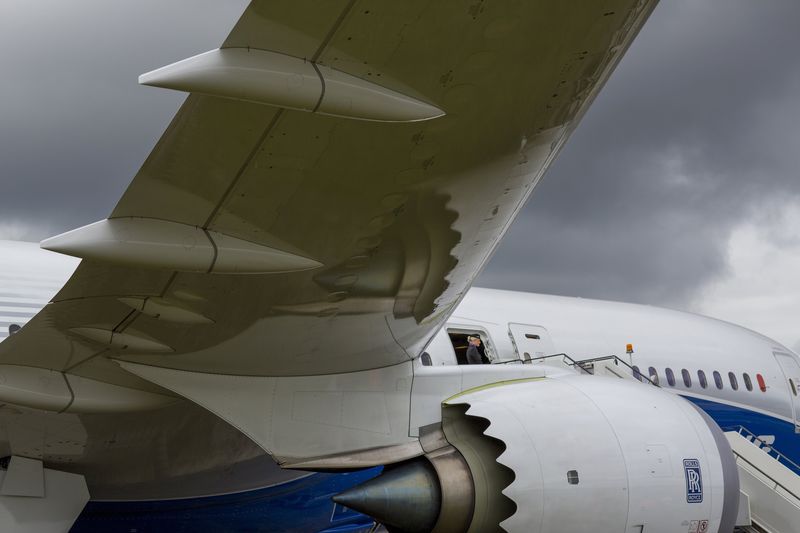FARNBOROUGH, United Kingdom - Boeing (NYSE:BA) [NYSE: BA] and European carrier Luxair have announced an order for two 737-10 airplanes, the largest model in the 737 MAX family, with options for two additional aircraft. This purchase comes as part of Luxair's strategy to grow sustainably and reduce its environmental impact. The new planes will join the airline's existing 737-7 and 737-8 models, enhancing fleet commonality and operational savings.
Luxair CEO Gilles Feith emphasized the move as a step towards modernizing the fleet with technology that not only supports growth but also advances the airline's decarbonization goals. The 737 MAX family is noted for reducing fuel use and carbon emissions by 20 percent compared to previous models, which aligns with Luxair's commitment to efficiency and sustainability.
Additionally, the aircraft are designed to create a 50 percent smaller noise footprint, which will be particularly beneficial for operations at Luxembourg Airport.
The 737-10's capacity allows for up to 213 passengers with a minimum of 30-inch seat pitch, and the ability to fly routes up to 5,740 km (3,100 nautical miles). This will enable Luxair to meet the increasing demand for leisure travel with more capacity and range.
Brad McMullen, Boeing's Senior Vice President of Commercial Sales and Marketing, highlighted the flexibility the 737 MAX family will offer Luxair in matching aircraft size to market demand.
Luxair, which celebrated its founding in 1961, has grown its route network by 30% over the past two years and now serves 94 destinations with a fleet that includes two leased 737-8s and eight Next-Generation 737s. The airline plays a significant role in the economy of the Grand Duchy of Luxembourg and the surrounding region, offering a wide range of air services and holiday packages.
Boeing, a leading aerospace company, continues to develop and service a broad range of commercial airplanes, defense products, and space systems.
The information in this article is based on a press release statement from Boeing.
In other recent news, Dubai-based airline flydubai is facing significant delays in aircraft deliveries from Boeing, impacting its fleet expansion efforts and disrupting its route development. The airline highlighted the strain this has put on its ability to meet the surge in travel demand post-pandemic. In contrast, Korean Air is set to purchase approximately 20 Boeing 777X jets, marking a substantial commitment to Boeing's long-delayed aircraft program.
Meanwhile, U.S. Senator Jerry Moran is taking measures to protect defense jobs at Spirit AeroSystems (NYSE:SPR) amid Boeing's planned acquisition of the Kansas-based supplier, emphasizing the need to maintain continuity of work in Kansas.
In the backdrop of these developments, aviation executives convened at the Farnborough Airshow, grappling with industry-wide challenges such as jet shortages, supply chain issues, and environmental concerns. Boeing and Airbus, both facing production challenges, are working towards improving their manufacturing processes. The airshow discussions also centered around overcoming production hurdles, navigating political uncertainty, and advancing sustainability in aviation.
InvestingPro Insights
As Boeing [NYSE: BA] secures a new deal with Luxair for its 737 MAX aircraft, the financial landscape for the aerospace giant shows a blend of challenges and industry standing. Notably, Boeing's market capitalization stands at $110.58 billion, reflecting its significant presence in the Aerospace & Defense industry, an InvestingPro Tip highlights. However, the company faces financial headwinds, with a negative P/E ratio of -50.58 and an adjusted P/E ratio for the last twelve months as of Q1 2024 at -87.88, indicating that analysts are skeptical about the company's profitability in the near term.
InvestingPro Data also shows that Boeing's revenue grew by 8.37% over the last twelve months as of Q1 2024, suggesting some positive momentum in sales despite a quarterly revenue decline of -7.54% in Q1 2024. Gross profit margins remain a concern, as another InvestingPro Tip points to weak gross profit margins, with the last twelve months as of Q1 2024 showing a margin of 11.48%.
For investors and industry observers considering Boeing's stock, it's worth noting that the company is currently trading at a high EBITDA valuation multiple and does not pay a dividend to shareholders. These factors, coupled with the volatile stock price movements, could influence investment decisions.
For a deeper analysis and additional insights, readers can explore more InvestingPro Tips on Boeing's financial health and stock performance by visiting InvestingPro. With 14 analysts revising earnings downwards and concerns over profitability, there are currently 9 additional InvestingPro Tips available to help investors make informed decisions. Use the coupon code PRONEWS24 to get up to 10% off a yearly Pro and a yearly or biyearly Pro+ subscription for more detailed insights and data.
This article was generated with the support of AI and reviewed by an editor. For more information see our T&C.
